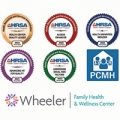Managing Anxiety About Returning to the Workplace

With anxiety continuing to rise as we learn more about the spread of COVID-19, returning to in-office work may be a source of additional stress. Creating a balance between our personal well-being, work environment and responsibilities can be helpful in managing concerns about personal safety and reservations about how to adapt to new routines.
Dan Fallon, LPC, CEAP, program manager of Wheeler's Employee Assistance Program, offers tips to reduce anxiety for both employees and employers.
Recommendations for Employees
Continue to follow the recommended measures to prevent spreading the virus. Take care of yourself and others by taking the necessary precautions during your interactions at work. If the kind of work you do creates additional concerns, discuss potential changes, and follow the instructions from your manager.
Propose additional suggestions. If you find yourself coming up with more ideas outside of the recommended safety measures, discuss these with your manager. Remain optimistic in that your suggestions could be beneficial to your workplace and create an easier transition for the rest of your team.
Keep communication open with your manager. Be honest with your manager if you need certain arrangements based upon the needs of children, an elderly family member at home, or health conditions that put you at greater risk for COVID-19 infection. Establish fluid and open channel of communication to discuss apprehensions you may have about your work situation.
Be patient with yourself and your coworkers. Returning to in-office work from COVID-19 puts everyone in circumstances that are new. As you return to your former focus and routines, be patient and trust that your team will develop a comfortable rhythm.
Take care of your mental health. Anxiety and fear are normal when you come back to work after a stressful event. If you realize that you are not able to manage these feelings, ask for help. Seeking assistance is a strength and there are various resources you can locate, including your confidential employee assistance program (EAP) or other behavioral health resources. Learn more about Wheeler's EAP program.
Recommendations for Managers
For some employees, returning to in-office work may be a welcome opportunity. For others, such as those who are caregivers or concerned about their health, leaving home to return to the office can increase stress and worry.
Leaders are role models for employees during a crisis. Acceptance that returning to the workplace is not a return to the way people previously worked is essential. Employees look to leaders who are flexible, consistent in communications, and a role model for showing support and encouraging individual control and decision-making.
Prepare for the return by supporting employees now. Set a tone that emphasizes concern for employee well-being by offering compassion, honesty, and openness. Recognize that every employee had a different experience and reaction to the pandemic and remote work, each facing unique stressors. Check in with employees frequently and actively listen to reduce employees’ uncertainty and build emotional support.
Take an individualized approach. Provide autonomy to managers and direct supervisors to help employees develop individualized plans. Employees returning to the workplace may need new approaches to routines that they have lost; supervisors play a role in helping staff structure their day.
Involve employees in discussions about their workspace. Employees who are informed and participate in decisions about their own space have greater psychological comfort in the workspace. This engagement helps them adapt to changes beyond their control, such as requirements to promote physical distancing.
Promote employee assistance program and behavioral health resources. Managers also play a key role in supporting mental health and well-being and are the frontline in recognizing employee mental health struggles. Let employees know that it is a strength to access the organization's confidential employee assistance program (EAP) and other behavioral health resources.





